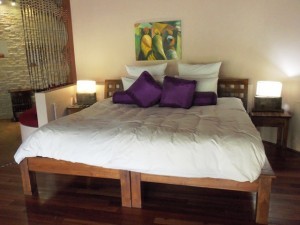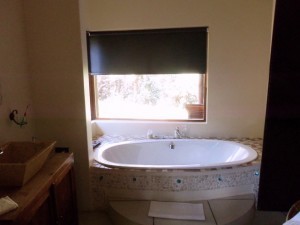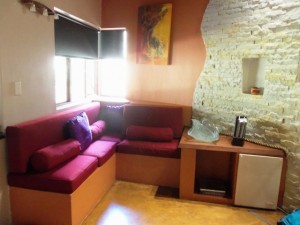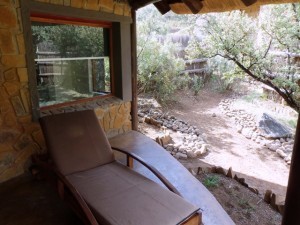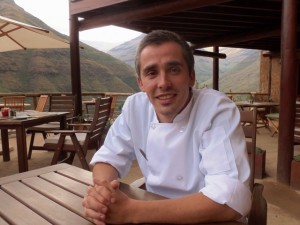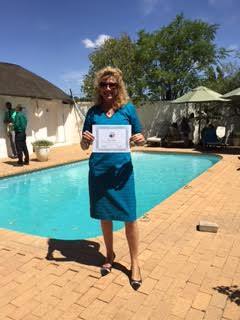Sonia Marsh's Blog, page 6
January 3, 2016
Home can be anywhere you choose it to be.

My new studio rondavel
Around 10 a.m., an old blue truck makes it way to the top of the hill, and stops a few feet from my room. It’s Sister Bernadette, the Principal of the Catholic school where I shall volunteer as a primary education teacher with the Peace Corps, and her driver. When I see the empty truck bed, I’m no longer upset that Sister came along. In fact, having a nun with you in Lesotho is an asset, as everyone is eager to help her.
We load the truck, and I’m crammed in the back seat with a large cardboard box, and my stainless steel water filtration system. I’ve finished my ten weeks of Peace Corps training in a rural village and cannot wait to move to my new village which will be my home for the next two years.

My space on the back seat
“Would it be possible to do some shopping in Maseru? I’d really like to go to Pioneer Mall.”
“Yes, no problem,” Sister Bernadette replies, which I barely hear as the radio is cranked up so loud, it sounds tinny.
The driver, a large man, reminds me of a black version on my ex-husband. He cranks the radio up and I can no longer hear myself speak. What the hell is wrong with people’s hearing in Lesotho? My sons used to make fun of me back in the U.S. saying that I must be getting old as I kept turning the volume up on our TV, but here in Lesotho, everyone must be deaf.
“Is that a soap opera?” I ask Sister Bernadette. The man is yelling, and it sounds like he’s telling someone off.
“What’s he yelling about Sister?” I repeat.
“It’s a prayer,” she says.
I forgot how Sister always has a million errands to run when she’s in the capital city. Fortunately they drop me off at the mall.
“Is it OK if I take a couple of hours to shop?” I ask, feeling like I’m asking a huge favor.
“No problem,” Sister says.
I run around getting everything done, as well as my “must-have” cup of drip coffee at the Renaissance Café, and then I call Sister. Within five minutes, they pick me up at the mall, with my duvet, pillows and extra bags of goodies.
I apologize for taking too long, and Sister does not respond, so now the guilt sets in.
I’m so looking forward to heading home to my new rondavel, and I check my watch; we should reach my new village by 4 p.m.
After ten minutes, Sister says, “I need to stop and deliver some papers for our school.”
I sit in the car with the driver, and she returns ten minutes later.
Okay, so now we’re on our way home.
“You wait here,” says the driver, as he parks his car on a busy main road, and he and Sister get out.
It’s about 90 degrees outside and he’s parked the truck in the direct sun. I open my window, and there’s no breeze coming through. I open my door, and two young Basotho men start chatting with me. They want money, and while talking to them, I slide my purse under the water filter.
I make small talk to distract them.
“What do you do?” I ask,
“We deliver,” the young man says.
“What do you deliver?”
“We help you carry from shop.”
I then realize I’m at a Lesotho “Home Depot” and these guys deliver goods to their home or business.
“I need money. I have a child to feed.”
“How old are you?” I ask.
“Twenty-four.” He looks skinny and has deep wrinkles for a man his age. I compare him to my middle son who is twenty-five.
At first I’m scared of these young men, and think they want to steal from me, but then I take a different approach; I decide to motivate and guide them, so I ask if they have business cards.
They look at me unsure of what I mean.
“You want customers. So you need to give them a business card so you are more professional than all the other men doing the same as you.” I show him my business card so he knows what I mean.
“You need to offer them a discount on their first ride if they pick you.”
The young guy’s face brightens up, and thanks me. Now I’m no longer afraid of these guys, and I do hope that I offered them something they may use to stand out from all the others lining up to help customers.
I’m baking in the back of the truck. When are they coming back? I’m afraid to leave the truck as it’s unlocked, and all my stuff is visible inside.
I wait and wait forever, melting in my seat, feet sticking out of the open window, and my water bottle is now hot enough to make instant coffee.
The driver walks back, and I tell him about the men harassing me, but that doesn’t faze him. He gets in the seat and I ask, “Where is Sister?”
“We go inside,” he says.
He drives the truck into the “Home Depot” parking lot, just a few feet away, and parks. Why the hell couldn’t he have done that in the first place so that I could cool off inside the building with Sister. I find her sitting on a bench inside, drinking a soda.
“What are we waiting for?” I ask.
“I buy some wood and tin for the Priest’s house,” she says.
“What? Is there room with all my stuff in the back?”
“No problem,” she says.
If I’d known that it would take three hours to load up the truck with wood and tin roofing, which seems to almost fall off the back of the truck, I would have stayed at Pioneer Mall. At least it was cool and comfortable there.

My Principal Sister Bernadette and our truck
I cannot imagine how this overloaded truck will climb up and down the steep mountains to my village, and how we shall be able to keep the tin and wood from sliding off, when we hit the rock and pebbled dirt road for 5 kilometres.
I am amazed by the amount of stuff people cram into cars, and by the risks they take, especially when people have to sit on top of one another inside a taxi or hang out of vehicles. The police don’t care whether a car is overloaded to the point of it being a safety hazard, even with children and babies inside.
I can’t believe it. We make it to my new village without a single mishap. The only problem is when we reach the peak; we seem to be at a complete standstill. What if we roll backwards? Will we make it, will we make it? I keep asking, and miraculously, we do, and then we slide down the opposite side like a roller coaster, gathering momentum for the next peak.
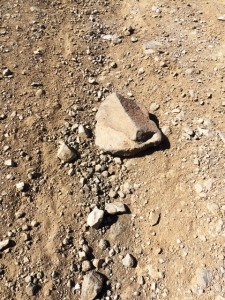
This is what the road is like to my village
My lovely new host mom is there to greet me when the truck pulls up. I’m so glad I get dropped off before the wood and tin panels. I’m exhausted from this entire day of waiting, shopping and sweating.
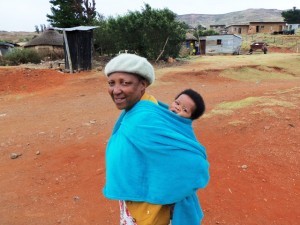
My lovely host mother and her grandson
Everyone comes out of “m’e Mary’s house to help with my bags and suitcases.
I’m home.
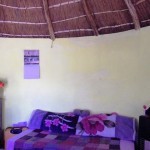
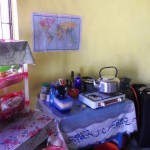
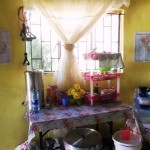

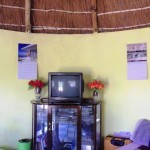

I have found my home in Africa. I have a habit of wanting to make each place I live in, feel like home; Africa is no different.
The post Home can be anywhere you choose it to be. appeared first on Sonia Marsh - Gutsy Living.

December 26, 2015
Maliba: Christmas At The Best Resort in Lesotho, Africa
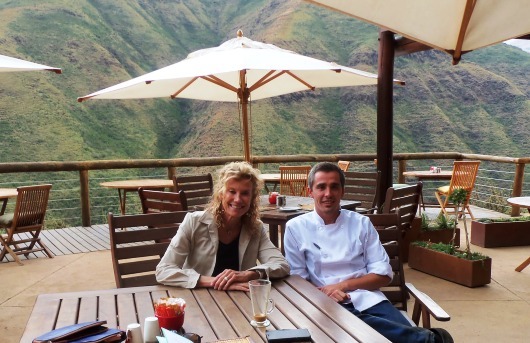
The brilliant Chef at Maliba Lodge, Nico Vorster
This Christmas, I decided to give myself a gift of love, luxury and to be completely responsible for my own happiness.
I admit, I felt sorry for myself, especially without a home to go back to, and I missed my three sons during the holidays. I’ve been on the go all year, starting with my divorce after a 28-year-marriage, studying for the TESOL certificate in London, volunteering in Spain, Thailand and a school in California, applying for the Peace Corps and then moving to Lesotho, Africa, in October 2015, I can say this has truly been the “Gutsiest” year of my life.
2015 is Chapter One of my new life, and I look forward to making the next two years of my Peace Corps life meaningful. I want to learn about the Basotho culture, to speak Sesotho and to start working on my secondary project which I want to benefit the people in my rural village. I’m drawn towards helping girls and women start a business that can offer them an income, so let me know if you have any suggestions. I have some ideas, but I’m curious what you think. It has to be sustainable.
This Christmas, I wanted to pamper myself, after ten weeks of intense Peace Corps training, and living without electricity and running water.
Why Maliba Lodge?
Because it is located in the beautiful mountains of northern Lesotho, and I needed to relax and get showers, baths, and meat and fish, which I haven’t had in my rural village since I don’t have a fridge.
So I ordered a private taxi to take me there, which happened to be a joke, because private, means 4 of us inside the taxi, 4 in the truck bed, and then stopping to pick up a dead pig to deliver at the next village.

Pig loaded onto my “Private” taxi which I paid for.
I finally got my private taxi in Maseru, and the drive took three hours. We listened to Whitney Houston, and Mariah Carey, all the way to Maliba, and I think Whitney sang “I Will Always Love You” fifteen times.
Maliba is like being on another planet. My room is so beautiful, that I keep taking photos from every angle, saying this is how I want my shower to look when I move back to the U.S. Who needs a shower door when the open concept works?
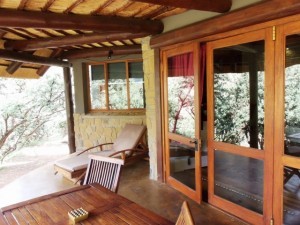
My Patio
Can I get a thatched roof in the U.S.? This is how I shall get an architect to design my bedroom and I love these doors made of solid wood, and the light coming in from the patio. This room could be my entire house, and I’d be so happy when I move back, to design it just like this. I fall in love with the room and forget how expensive it would be to have a custom designed small home.
Video of my morning at Maliba. So quiet and peaceful.
When I walk outside the main lodge overlooking the mountains, I find a group from Australia, South Africa and Europe. They are all related and I ask them if I can join them as I’m alone. They say “Yes,” and I end up looking at Eland through binoculars on the mountain slopes.
The food is outstanding.
Breakfast is a buffet with cheese, smoked salmon, yoghurt, cereals, flaky pastries, nuts, meats, bread and butter.
Then a cooked breakfast of your choice.
Lunch consists of salads, gourmet burgers, and a dessert.
Dinner is filet mignon, rack of lamb, fish with asparagus, and tarte tatin, all beautifully prepared and presented.
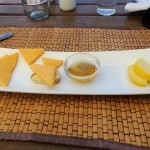





I interviewed the chef, Nico Vorster, who is only 28, the age of my oldest son.
He is South African, from Cape Town, and at such a young age, he’s worked in Orlando, for Disneyworld, at the Animal Kingdom Lodge. He also worked on Disney cruise ships as a chef, and was hired by the Ruperts in South Africa, (one of the wealthiest South African families.) Nico was also a chef at Terra del Capo, and a private chef for two wealthy South African families.
Nico has been the chef at Maliba lodge for 5 months, and I asked him if he is bored being isolated in the mountains of northern Lesotho. He says, he loves nature and, “You must adapt to your location.” He also loves hiking with friends, and eating lunch at the top of the mountain. He has many creative ideas for his restaurant and says it’s important to “Bring the warmth into the place from the outside.”
I am now back at my rural village and shall blog about my new home next weekend. Please come back to see photos of where I live, and how I’ve started decorating my rondavel.
The post Maliba: Christmas At The Best Resort in Lesotho, Africa appeared first on Sonia Marsh - Gutsy Living.

December 18, 2015
Swearing in Ceremony with the U.S. Ambassador of Lesotho
I was sworn in as a Peace Corps Volunteer, by the U.S. Ambassador of Lesotho, Matthew Harrington, on December 16th, 2015.
Our pre-service training lasted ten weeks, and I found it far more intense, and stressful, than I had anticipated.
Our schedules were jam-packed with workshops on all sorts of topics related to health, security, culture, and learning Sesotho, the language of Lesotho.
My final two weeks flew by with practice teaching grades 4 and 5, at a Catholic school, as well as our final language test, setting up our banking with Peace Corps ATM cards, shopping for pots, pans, mops, buckets, and all the necessities for moving to our new sites. Peace Corps vans dropped all 36 of us trainees off at a mall, and gave us two hours to shop and eat lunch. All of us ended up in the same store, looking for the same items.
What a hectic experience, especially as the mall had “no water,” so the restrooms were closed, and I could not get a coffee to perk me up, so my lack of caffeine migraine set in. We did not get home until dark, and I ended up packing with candlelight as my solar lights quit working.
The following morning was swearing in, and all the women in our group wore traditional Seshoeshoe dresses.

Bo-M’e dancing and singing
We were driven to the U.S. Ambassador’s house in our Peace Corps vans, while our host mothers, (Bo-‘M’e), and language teachers, boarded a private chartered bus. They wore their best dresses and the singing, dancing and whistling sounds were loud and festive already at 7:30 a.m.
We entered the tall black gate with security guards at the Ambassador’s house, and white tents offered shade during the ceremony, and lunch. The American flag, and the red, white and blue draped chairs, created an official setting.
Local Lesotho TV crew was there to film the Ambassador, as well as our Peace Corps Country Director, Wendy Van Damme, and the Honorary Deputy Minister, Thabang Kholumo.

Ambassador Harrington
The ceremony lasted two hours, and our host mothers danced and sang for us between speeches. I was so proud of one of our PCVs, Katie DuBose, who made a speech in Sesotho. She mastered the language during our ten-week course, and if only I could speak Sesotho, half as well as her, I would be able to communicate well with the Basotho.
Ambassador Harrington did the swearing-in, and we each received our official Peace Corps certificate.

PCVs in their Seshoeshoe dresses
A catered buffet was offered to all, and it’s amusing to see how much we PCVs appreciate a real meal, with meat and fish, after eating eggs, lentils, peanut butter and bread for weeks.
After lunch, the Ambassador allowed us to swim in his pool. I decided to chat with Wendy Van Damme, in the Ambassador’s back yard.
It was a special day for all of us, and now I’m as happy as can be at my new site where I shall be teaching English for the next two years as a Peace Corps Volunteer.
I shall post about my new rondavel (round) house and how I have made it cosy in my next blog post.
The post Swearing in Ceremony with the U.S. Ambassador of Lesotho appeared first on Sonia Marsh - Gutsy Living.

December 6, 2015
Peace Corps Trainees Finally Get One Day to Relax
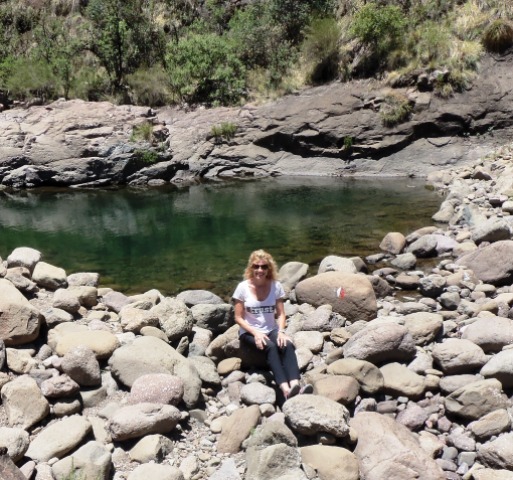
The water hole for swimming
Peace Corps Trainees finally get one day to relax, after a week of teaching 3-4 lessons a day, followed by learning Sesotho and practicing for our final language exam.
We have been observed and critiqued daily, and working hard to get all our lesson plans done according to the Lesotho structure.
Even though it’s a day of relaxation, we never get to sleep in. The bus leaves at 7:30 a.m., supposedly but by the time everyone is on board, it’s more like 8:30 a.m.
We’re visiting the Tsehlanyane National Park, in the northern part of Lesotho, where there’s a beautiful waterfall.
23 Peace Corps trainees are crammed into a bus, and I make sure I’m in the front, next to the window. Music is blaring from someone’s iPod, and everyone starts singing. It’s a long journey.
We stop at Shoprite to buy snacks, however, some of us were (mis)informed, that we were supposed to shop for the week; this would be our only chance. As usual, I take my grocery shopping seriously, as there’s hardly anything to buy except eggs, onions, cooking oil, laundry detergent, candy and beef bouillon cubes at my tiny “Macufe” village store. This Shoprite is amazing! It’s almost like a U.S. grocery store with mushrooms and green beans—yes I haven’t had mushrooms since October 4th— and as I searched for butter, I only found butter spread, but at least that’s better than nothing.
Once we reach the National Park, which does have an entrance fee of 30 rand, (approximately $2.00,) we are in a giant picnic area with BBQs and a lawn; something else I haven’t seen in a while.

My Peace Corps trainee friends enjoying the afternoon
My training village landscape is more like a desert with sand blowing through the cracks under my door and windows.

Sonia in front of Wood carving in lodge
I see Thomas, the only other “older” Peace Corps volunteer, I haven’t yet met, in our crowd. It’s always comforting to meet someone over 50, when you’re with young volunteers all the time. I decide to follow Thomas and a couple of other volunteers towards a beautiful water hole, where we can swim.

Thomas a fellow European/American PCV teacher in Lesotho
I stick my foot in the water and am so tempted to jump in, but decide that I’m in the mood for a glass of wine, and a bit of pampering at the 5 star Maliba lodge on top of the mountain. This is the lodge that I booked for myself for a mini-vacation. I was eager to see it. We hike up a steep hill, and by the time I reach the top, I’m all sweaty, and ready for my ice-cold glass of wine.

Thomas and I enjoying lunch and some wine.

Views from Maliba Lodge
I finally get to sit on a comfortable couch, instead of my white plastic chair at home, or the narrow bench at school. I’m in heaven, and I can finally relax, and think about how I’m going to take care of myself, and stay at this lodge as a special treat.
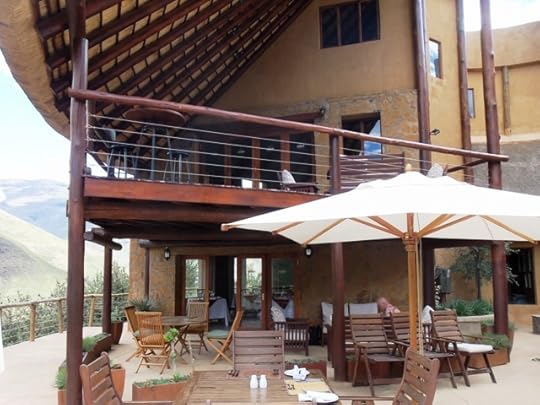
Beautiful lodge
I look forward to relaxing with wifi, TV, a comfortable bed, electricity, and let’s not forget a nice shower and toilet. I won’t need my pee bucket, nor a bucket to bathe in. I might even get a massage. I deserve to pamper myself, and that’s what I’m going to do.
The post Peace Corps Trainees Finally Get One Day to Relax appeared first on Sonia Marsh - Gutsy Living.

November 25, 2015
This is Where I Shall be Teaching and Living in Lesotho

The teachers at my new school
I’m so excited to know where I shall be teaching and living for the next two years in Lesotho. Our Peace Corps training is almost over, and I’m tired of living out of my suitcase. Starting on December 17th, after our swearing in, I can move into my own rondavel.

My new “rondavel” home
Our training lasts ten weeks, and I’m ready for the next move. Fortunately Peace Corps arranged for a much needed break with “showers and lots of protein” (most of us lack meat and fish as we don’t have fridges to keep our food cold.)
We stayed at Mount Maluti hotel in Mohale’s Hoek, where we attended workshops with our Principals and ILs (Introductory Liaisons.) I left the hotel with my Principal, Sister Bernadette, and my new IL, and it took us eight hours by bus, to reach my new site.

My sweet mother, ‘M’e Mary
As soon as I saw my new m’e’ (host mother) Mary, I felt at home. She is 62, and has the most beautiful smile. She walked me to my rondavel, next to her house. I stepped inside my new home with sunshine-colored walls, and Mary said, “I shall do everything for you. I am so happy and blessed to have you here.” The rondavel was furnished, with a glass cabinet full of plates, bowls and glasses that Mary said I could use. She gave me new pots to cook with, and brand new bedsheets. I noticed a TV set, and was confused as there is no electricity in my rondavel. Mary said she has solar panels on her roof, and when I move in on December 17th, she would show me how to use the TV.

M’e’ Maria is letting me use her glass cabinet and TV
Mary is a widow, and a 2nd grade teacher at my new school. She is retiring in December, and wants to help me learn Sesotho. “The children have prepared a day of dancing and songs for you all day tomorrow. Everyone is so excited to meet you,” Mary said.
The 6th grade teacher couldn’t wait to meet me so she stopped by my rondavel, just as I was getting ready for bed, and said, “We are so excited to meet you. You have been sent by God, and we are so blessed.”

My new 6th grade teacher whom I shall be working with.
I feel like a celebrity here. Everyone’s excitement to meet me is not what I had expected, and I’m trying to learn about the Basotho culture which values relationships and “togetherness,” while many westerners like their “alone” time. Apparently the Basotho think that we’re depressed when we’re alone in our homes.
I slept well, and Mary’s rooster woke me up at 3:48 a.m. At 7:30 am, Mary and I walked to school. I greeted the village chief along the way. As soon as we reached the school, all the children came running down the hill to take a look at me, but were shy when I started asking them their names. High fives, seem to be the way to get them to come closer.
Mary took me to the staff room where I met the other teacher took photos of everyone. I’ve discovered that taking photos is one of the best ways to be on good terms with everyone. They love having their photo taken, plus I can place their names with their faces.
Mary drew flowers on the board, and my “Welcome ‘m’e Palesa” greeting. That’s my name in Sesotho, which means flower.

This is what my ‘m’e wrote to welcome me in the staff room
So the children danced and sang for me, and this is something the Basotho love to do. I hope to learn to flick my hips backwards, the way they do it.

Another dance by the 6th graders

Adorable Kindergarten children danced to welcome me as their new teacher
Watch them dance for me.
So now you can see the teachers and children that I look forward to working with starting in January 2016.
Happy Thanksgiving Everyone. More about how we are celebrating our Peace Corps Thanksgiving.
The post This is Where I Shall be Teaching and Living in Lesotho appeared first on Sonia Marsh - Gutsy Living.

November 16, 2015
Cultural Differences Between Americans and the Basotho

With my new Principal, Sister Bernadette and teacher at a workshop in Mohale’s Hoek, Lesotho
There are major cultural differences between the Americans and the Basotho, and I shall share a few that our Sesotho language teachers gave as examples when comparing life in the U.S. and life and expectations in Lesotho.
Relationships come first in Lesotho.
The # 1 difference is that people always come first in Lesotho, which is why it is so important to greet everyone you meet. I make a point of saying, “Dumela ‘m’e, u phela joang?” (Hello, “mother” how are you?”) to every woman I meet along the dusty, dirt road towards school.
Time is Money in the U.S.
In America, “time is money,” and people are always in a hurry to get things done, and accomplish their goals. Money is more important than relationships, whereas in Lesotho, it’s all about taking time to greet everyone, including the kids you meet; asking them, “How are you? Did you sleep well? How did you wake up today?” followed by, “Be well,” and “Go in Peace.”
Why Dogs Are Not Considered Pets in Lesotho
Our language and cultural Basotho (people of Lesotho) teachers are outspoken, and one of them explained that the reason the Basotho don’t treat dogs as pets is because of what happened during apartheid. The Boers (South African of Dutch, German, or Huguenot descent, ) would only let the blacks sit in the truck bed, whereas they let their dogs sit in the front seat. She said, that people now understand that we (Americans) truly love our dogs and cats, and after explaining the reasoning behind the treatment of dogs, all of us Peace Corps Trainees, gained a new understanding of why dogs are not allowed in their houses as they are not considered pets in Lesotho.
Delivering babies
Here’s another cultural difference which I found interesting. When a woman delivers her baby, the husband finds out the sex of his child according to whether he gets 20 liters of water poured on top of him (a girl) or whether he gets beaten with a stick; (a boy.) Apparently fathers do not attend the delivery of the child, and if he’s sitting in his office, this is what his colleagues would do to alert him of the birth of his child.
Dress Code and Cleanliness is Very Important to the Basotho
Finally, the Basotho are very clean, and take great pride in dressing appropriately. Teachers always dress well, and are supposed to wear long skirts that hide their knees. I have not seen any women wear long pants, only skirts and dresses; however, young girls and women do wear jeans in the camp towns and Maseru, the capital.
The bo-‘m’e (mothers) seem to love to clean their houses and are busy sweeping, feeding the animals, doing laundry by hand, washing windows, and all of this using water which they have to transport from the community faucet by donkey, or by foot, if they are close enough. My ‘m’e gets her grandson, ten-years-old, to collect the water from town strapped to the donkey.
Gender Differences
There are many gender differences, such as the specific roles of men and women. Men are still the head of households, and are regarded as the authority figures in schools. Female teachers and even the Principal agree that the men eat and leave their plates for the women to clean.

The wonderful girls in Lesotho
Corporal Punishment in Schools
We had a rough time during our Peace Corps training workshops where we discussed the status of corporal punishment with our Principles and IL’s (Introductory Liaisons.) The 2010 government Bill states that it’s illegal for a teacher to beat a child, however we learned that this is common practice in schools today, and that there are very few repercussions. Many Principals and teachers state that this is the only thing that works with kids and that since their parents do it at home, they are used to this form of punishment.
Empowering Girls
It seems strange to hear about teachers agreeing to empowering young girls at the same time as they claim that women like to cook, clean and take care of their men, and that in their culture, the women often tell their friends to keep their mouths shut if they get abused by their husband.
I’m writing about what the Basotho have told me. These are not my personal opinions.
The Basotho love to sing and dance; even at a workshop
The post Cultural Differences Between Americans and the Basotho appeared first on Sonia Marsh - Gutsy Living.

November 11, 2015
My Daily Life as a Peace Corps Trainee In Lesotho

In the computer repair shop with fellow Peace Corps trainee friend, DeeDee
Here are the latest updates on my daily life as a Peace Corps trainee.
Do you remember how upset I was about my laptop screen not working and my camera SD card having a virus? Well here’s the great news first.
I found a wonderful young tech guy named, Tobias, in our closest camp town to fix my laptop screen and remove the virus from my camera SD card.
Now the method he used might be considered a little “strange,” but it worked. He unscrewed the screen and showed me a wire that needed to be replaced. When I asked him if he could replace it, he said he didn’t have the part for my Lenovo laptop.
I refused to give up, so I told him about a YouTube video I found on how to fix a flickering screen. Tobias asked me to leave my laptop with him for an hour, and he’d try to fix it.
One hour later, I discovered a piece of folded paper at the bottom of my screen. The screen no longer flickered; it worked perfectly. No need for Best Buy’s $199/year service, when a piece of paper can do the trick.

See the paper to the right of the Lenovo sign
“How much do I owe you?” I asked.
He shrugged and said, “I don’t know, 50 rand.”
That’s about $3.50 for one hour of his time. I told him I would send all my Peace Corps friends to his store to get their computers fixed and to purchase solar panels.
Tobias then ran a virus scan and fixed my SD card for $2.00. Now I can take better quality photos with my Kodak camera again.

My wonderful $10 radio
I bought a radio for $10.00 in town and my life since then has changed.
Not only can I get South African radio, but I found a French radio station which makes me feel close to my dad in Paris and my French relatives. I enjoy listening to the argumentative debates when the sun sets at 7 p.m., as this creates a lively atmosphere in my candle-lit room, during dinner.
Listening to South African radio is quite eye opening when you come from the U.S. You get a completely different perspective on the world. I hear topics that don’t appear in mainstream news in the U.S. For example, South Africa wants to start teaching Mandarin in schools as the Chinese invest more money than the U.S. and Europe in Africa.
There are two billion people who speak Mandarin; more than any other language in the world. Spanish is the second language, and English is the third most spoken language in the world. The South African radio interview mentioned how important it is for the next generation to speak Mandarin in South Africa. “It’s not colonization; it’s not compulsory.”
Finally, the last piece of wonderful news is that I now know the name of my 500-person village and Catholic school where I am going to be teaching English for the next two years. I visit my new site and school next week during our training. It’s a thatched-roof rondavel.
Come back and see my new home next week. So HAPPY, I get a shower for the first time in over a month, as we’re staying in a hotel for training on Friday-Monday.
The post My Daily Life as a Peace Corps Trainee In Lesotho appeared first on Sonia Marsh - Gutsy Living.

October 31, 2015
Daily Glitches in Lesotho

At the top of mount Thaba Bosiu
I’m experiencing a few glitches since I arrived in Lesotho.
My camera SD card is no longer working, and for several days, it was blocked, and I couldn’t take any photos.
Since we cannot go to town to purchase anything, I’ve been stuck.
Now my laptop screen is not working. It’s all fuzzy and won’t go to my login page. This happened right after I charged it with my ‘m’e’ (host mother’s) generator. I was so excited to use her generator, as I wanted to blog, and now it’s broken.
I’m sitting in the local Internet Cafe in my camp town village, and was hoping that the owner could fix my screen. He said he couldn’t.
So this post will be extremely short, as I have to catch a 15-passenger taxi back to my village. We’re supposed to be back at 4 p.m., so I have a little time to buy coffee, eggs, butter and hopefully some “real” cheese, which I haven’t had since I arrived in my village.
This morning we climbed a steep and rocky path to the top of Thaba Bosiu, which acted as Moshoeshoe’s headquarters during the various Basuto Wars.
I shall try to post more later, but my time is running out.
The post Daily Glitches in Lesotho appeared first on Sonia Marsh - Gutsy Living.

October 23, 2015
My First Experience Teaching in a Small Village in Lesotho

My first experience volunteering in a small village school
After two weeks of training in our village, with 36 other Peace Corps volunteers, we were finally given the opportunity to see what it’s really like to teach in a small village school.
We all boarded combis (taxis that can hold up to 15 people, all squished together,) and as fate would have it, ours was the oldest taxi, and it broke down on a hill towards Teyateyaneng or (TY for short) our camptown.
We had already paid the cab driver our 7 Maluti, and one of our volunteers wanted a refund.
“I don’t think you’ll get a refund. This is Africa, not the U.S.,” I said.
Stupidly, my backpack weighed about 25 pounds, and I didn’t realize we would have a big hike up the hill, as well as to my HVV (host’s volunteer village — a one-hour walk in the rural foothills and valleys surrounding our camptown: TY.)
Our host volunteers took us to a nice resort hotel the Blue Mountain Inn, in TY. If you visit me, this is a nice place to stay.
We have free Wifi and electricity, so we take advantage of this, and order a cold beer and lunch. I was so happy to eat a fresh salad with feta cheese; first one in 2 weeks. I love Basotho papa and morojo, and their fresh beets and pumpkin, but I craved a salad with balsamic vinegar and oil.
Hanna and I were met by Hillary, our host volunteer, and she took us to her house after lunch, and a quick tour of the supermarket in TY. I was so happy to see butter and cheddar cheese.
The three of us climbed into a 4+1 (taxi) to Hillary’s road, and little did I know, that we had a 5 km hike up and down hills, before we reached her well-built, cement-brick rectangular house, with a thatched roof.
Her ‘N’tate (host Father) is such a hard-working man, who retired from gold-mining in South Africa, and managed to save enough money to build a beautiful house. He does not have electricity, but raises chickens, and grows numerous crops. His wife bakes delicious fresh loaves, and sells the eggs to local villagers.
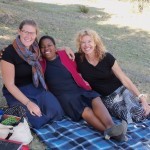



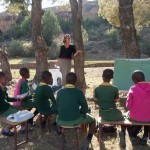
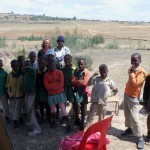
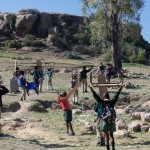

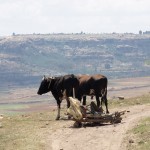
Hillary’s place was big enough for all 3 of us, and I slept on the floor. We had delicious home-made tortillas, pizza, and even watched a movie on her laptop.
The school we visited is a 30-minute hike from her house, and the children were so warm and friendly, calling us “Madam.”
The 7th grade children had exams, so the school schedule was modified. We taught outside, and the children are used to carrying their benches on their heads back and forth to class every day.
So far, I feel more confident that I shall be able to teach these beautiful, smiling children. I just need to learn my Sesotho, and that’s a challenge for me.
More to come when I have Internet access again.
ANY QUESTIONS FOR ME?
The post My First Experience Teaching in a Small Village in Lesotho appeared first on Sonia Marsh - Gutsy Living.

October 17, 2015
My new life: What it’s like to live in Lesotho?

With my new PCV friends getting our water filters
My new life: What it’s like to live in Lesotho?
My life is so different here in Lesotho as a Peace Corps Volunteer.
I have so much to share with you; I don’t know where to start.
Instead of writing a super-long blog post, I’ve decided to share the basics about my new life as a Peace Corps volunteer in training. I’m sure you want to see photos of where I live, my new host family, and my rural surroundings. I’m now living with donkeys, dogs (a ton of them,) roosters, chickens, sheep, and numerous cats, especially kittens.
Whenever I have access to an Internet connection, and electricity, I shall post my daily life in more detail. (Not sure exactly when, but I hope you’re interested.)
I can’t believe that this time two weekends ago, I sat in a fancy restaurant in San Clemente, California, enjoying Cioppino, with shrimp, fish, muscles and scallops in a delicious tomato broth, with warm sourdough bread and butter and a glass of Chardonnay.
Now I’m eating papa, (a maize powder cooked in boiling water) with morojo (chopped greens cooked in oil) with stewed pumpkin and carrot slaw. I eat a ton of carbs, and very little protein, compared to what I ate in California.
I’ve been adopted by my host mother or (‘m’e) Mathuso, and she is very caring and sweet. She shows me how to hand wash my clothes outside in a bucket of cold water which was transported up the hill by donkey.

PCV, Michelle, showing us how to take a bath

view of countryside
‘M’e gets upset when I don’t arrange my multipurpose bedroom/kitchen/bathroom (basically my pee bucket, and plastic bath tub,) the way women do it in Lesotho. I find it strange that my host “mother” is four years younger than me, and she makes me feel like a child who has no clue what she’s doing, despite having been a mother/cook/cleaning lady myself for 37 years.
I now have a nine-year old sister, Ausi (sister) Boitumelo, a brother, Abuti (brother) Tebeho. They help me pronounce new vocabulary words in Sesotho; another challenge as I have three months to learn this foreign African language, before I get shipped off to my future village, where I shall teach English in a primary school for two years.

My new brother and sister.
I’m learning to adapt as fast as I can, but it is stressful to have Sesotho language classes every day, and to be bombarded with friendly Basotho people from the village stopping you on the dirt road to ask you questions about your Sesotho name, (mine is ‘m’e Palusa which means flower) where you’re you’re from etc. They speak so fast, and I’m finding the pressure is on to learn the language quickly.
We also have Peace Corps classes from 7:30 a.m., until 5p.m., daily, and then homework and studying in the dark room with no electricity. Taking a bucket bath, and daily chores take forever, so I feel more stressed now than I did in Orange County.
I have a paraffin lamp to study when it gets dark around 6:30 p.m., and thankfully my headlamp so I can find my pee bucket at night. We are not allowed outside to use the latrine, due to the guard dogs who get into vicious fights almost every night.
More to come later.
By the way, if you’d like to connect with me, apart from e-mails, please sign up for what’s app. This is a FREE APP, and we can chat and send messages. I shall e-mail you my Lesotho phone # if you’d like to communicate with me on What’s app. E-mail me at:
Sonia@soniamarsh.com
Sala hantle, (stay well.)
The post My new life: What it’s like to live in Lesotho? appeared first on Sonia Marsh - Gutsy Living.



